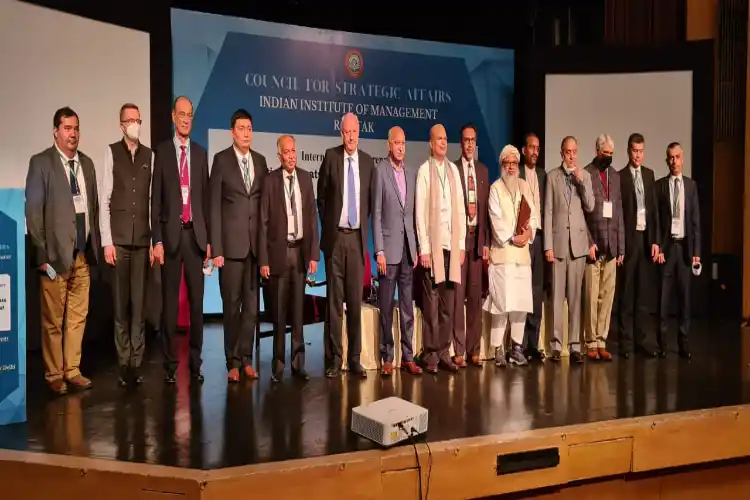
New Delhi: Speakers from more than 20 countries at a two-day conference on “Radicalization: Threats to the Architecture of Global Stability” have blamed Pakistan for the radicalization of a large number of people in Afghanistan and the instability in that country.
Council for Strategic Affairs, Indian Institute of Management Rohtak organised the international conference on the topic “Radicalization: Threats to the Architecture of Global Stability” on December 10 and 11 at India Habitat Centre, New Delhi.
Afghan ambassador to India, Farid Mamundzay in his keynote address pointed out that after the withdrawal of the US Troops from Afghanistan, the Pakistan Army plundered away the arms and ammunition left behind by the US Army.
“Hundreds of military vehicles with a large haul of arms and ammunition were taken away by Pakistan Army to Sialkot and other places in Punjab, Pakistan where they manufacture their own military equipment,” he said.
Mamundzay also asserted that given the positive role that India has played in rebuilding Afghanistan in the last two decades, it should be made part of the Troika constituted on Afghanistan-related issues.
“India should be a part of the deliberations of any international body constituted for dealing with the issue of Afghanistan crises. India’s presence in the UN Security Council as a non-permanent member will also benefit Afghanistan. Thus, the presence of India in the UN Security Council must continue. The International community must exert pressure on the interim–Taliban Government to prevent flagrant human rights violations and improvement of the status of women,” he said.
Hasanul HaqInu, a Member of Parliament from Bangladesh pointed out the stark differences in the foreign policies of India and Pakistan.
“While India has spent millions of dollars in building schools and other infrastructure in Afghanistan, Pakistan on the other hand had butchered more than 3 million Bangladeshi nationals and molested more than 200 thousand women in the 1971 war,” he said.
Talking about the impact of political implications of radicalisation, Amriddin Sharipov asserted that given the positive role played by India in the rebuilding of Afghanistan over two decades, Tajikistan believes that India can play a constructive role in resolving the current Afghanistan crisis.
Dr. Vijay Kant Karna, former Nepalese diplomat pointed out that Pakistan-based terror outfits had tried to use his country to launch attacks on India. “Pakistan’s Jaish-e-Mohammed and Lashkar-e-Taiba have tried many times to attack India using Nepalese soil but we caught them and handed them over to Indian authorities.”
He went on to say, “Measures that could reduce radicalisation include adopting secular policies, eliminating religious, cultural or ethnic differences, equitable access to state resources, empowering the marginalized and minority communities etc. would go a long way in curtailing radicalisation”.
Dr. Nuzhat Choudhury an eminent speaker on the genocide in Bangladesh said that the radicalised groups operating in Afghanistan and beyond do not believe in the concept of nation-states or international boundaries.
“Such challenge to the concept of nation-state can cause instability in regions across the globe, as extremist ideologies do not respect national boundaries. There is a need for the progressive Muslims to rise against Islamic radicalisation so that peace and calm can prevail in the Islamic world,” she said.
Dr. Chaudhury said that Pakistan is the focal point of terror in the world. She also said the CIA and ISI nexus was responsible for radicalization in Bangladesh.
Prof. Mahmood Marhoon, a lecturer at Kabul University said the conference reached a consensus that radicalization and instability in Afghanistan were primarily due to Pakistan.
“In International politics, it is frequently observed that local grievances become international and these grievances are then exploited by opportunistic elements as it had happened in the case of Afghanistan as well. However, if we introspect, then we would realise that local grievances become international because the people have low trust in their governments and government officials. Therefore, one of the best ways for the countries to reduce their vulnerability to radicalisation is through good governance and building trust in governmental officials,” he said.
In his closing remarks, Prof. Dheeraj Sharma, “It has become obvious that radicalisation has become a business for a few selected extremist groups, who are exploiting religion as a commodity for furthering their own propaganda. However, the groups that have promoted the business of radicalisation have not taken into account the negative externalities of promoting radicalization, because of which the entire community has to bear the brunt. As rational thinking members of society, we must create awareness regarding the negative externalities of radicalisation, and conferences like these can contribute in this direction”.
Among other delegates at the conference were Prof. Abdusamat Khaydarov, former Uzbek diplomat, Prof. Marvin G. Weinbaum, Director, Afghanistan and Pakistan Studies, Middle East Institute, Washington, Mr. Tahir Aslam Gora, Eminent Canadian Broadcaster, Editor & Publisher, and Prof. Vadim B. Kozyulin, Head, Center of Global Studies and International Relations.
Council for Strategic Affairs at IIM Rohtak which organised the conference will bring out a white paper on the proceedings about a way to counter radicalisation and to ensure peace and stability in South Asia, Central Asia, the Middle East, and beyond.
